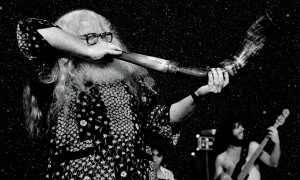Home » Jazz Articles » From the Inside Out » Paradise in Brazil
Paradise in Brazil
Taylor
 Ziriguiboom: The Now Sound of Brazil
Ziriguiboom: The Now Sound of Brazil
(Ziriguiboom / Six Degrees)
The Ziriguiboom label puts forth the sound of modern Brazil, and not just traditional samba and bossa nova but also plenty of electronic and club music. This sampler, assembled by Marc Hollander and Béco Dranoff (musical consultant for Angélique Kidjo’s luscious Black Ivory Soul ), compiles roster material from Bebel Gilberto, Zuco 103, samba-rockers Trio Mocotó and Bossacucanova, and others, combined with new works from Celso Fonseca and Cibelle, both of whom will release full length albums for the label in 2003.
The daughter of singer / songwriter and guitarist João Gilberto (known in Brazil simply as “O Mito” –“the legend”), Bebel Gilberto is probably Ziriguiboom’s most famous artist through her breathless and breathtaking 2000 debut Tanto Tempo, represented here by a remix of its title track by Peter Kruder of trendsetting European club mix producers Kruder & Dorfmeister. Trio Mocotó shakes down the house with “Os Orixas” from their twenty years in the making comeback, the charming and funky Samba Rock. So does Bossacucanova, three young Brazilian DJs / producers with guest vocalist Carlos Lyra who kick out “Influência do Jazz,” soulful Montuno funk strung along sly single note piano runs that wink and grin like Horace Silver weaving mischief.
It’s certainly no surprise but it bears mention that in Brazil there’s a whole lot of clubbing going on. Bossacucanova also appears with guitarist Roberto Mensecal, who led one of the first Brazilian instrumental bossa nova groups way back in 1958, to cut dashing figures through a smooth fusion of club music and soft jazz in the sleek Euroglide “Guanabara.” The production crew Raw Deal updates Erlon Chaves’ 1970s soul swinger “Cosa Nostra” into a funky hot dance track that bursts with cowbells and cymbals and whoops and flutes, softly dusted with electronic strings like confectioners’ sugar, plus a touch of be-bop in its peppery blue horns. Suba’s “Tantos Desejos,” remixed by Nicola Conte, “updates” its modern club thumping sparkle with the quaint island roots sound of trombone.
 P’Taah: Staring at the Sun
P’Taah: Staring at the Sun
(Ubiquity)
Staring at the Sun is the second project as P’taah by producer, composer, and keyboard player Chris Brann, who has also released experimental club and electronic music as Wamdue and Ananda Project. Vocalist Terence Downs returns from the first P’taah set, Compressed Light, along with members of the roots electronica collective Kudu plus Julius Speed on Rhodes and other keyboards. Brann’s vision, expressed through eleven compositions interspersed with three ambient “Meditations” by Kima Moore, brushes Brazilian shades – specifically the pastels of airy vocals and melodies – into broader strokes of modern electronica, jazz fusion, and club music.
“I think the album covers some different angles of my influences. The Chick Corea, Herbie (Hancock) vibe, especially in the Rhodes sound. I’m fascinated with early Return To Forever, with Airto and Flura Purim,” says Brann. “This really sums up so much of my emotional influence and it truly represents ‘fusion’ music. There is also the more esoteric ECM overlay that creeps up as the album progresses away from the more club-oriented sound; Keith Jarrett, Steve Tibbetts and Pat Metheny / Lyle Mays are definite influences.”
This Sun provides precious little emotional warmth, due mainly to its fragile and icy, ECM-records’ style production, but it’s not without heat. The title track features Bramm on electronic keyboards in an edgy exploration of ground broken by Corea, Hancock, and Jarrett while in Miles Davis’ electric employ. Brann’s atmospheric and murky “Path” also conjures Davis’ mercurial modal spirit: Repeated piano chords, two pairs of two, lay the foundation for Gordon’s illuminative vocalese and trumpet passages that rise as slowly, steadily, and majestically as the morning sunrise. The sounds of Eddie Henderson meeting Pink Floyd meeting the Pat Metheny Group – wow!
Previewed in 2002 as the leadoff track of Ubiquity’s fifth annual label compilation, No Categories, Vol. 5, “Hold You Close” dances Brazilian vocals, vocalese and percussion through a dance club track full of surprising twists in rhythm, melody, and sound. “Become Who You Are” purrs like a luxury autobahn roadster along electric keyboard lines cool and long and sleek, while the set-ending “Passages” investigates the same retro-70s “detective show” imprint of Mastered the Art, the latest set from Bramm’s contemporary and labelmate Greyboy.
 Celso Fonseca: Natural
Celso Fonseca: Natural
(Ziriguiboom / Six Degrees)
If anyone sounds prepared to assume the soft, flowing mantle of such Brazilian music legends as Astrud Gilberto and Antonio Carlos Jobim, it is producer, composer, guitarist, and vocalist Celso Foncesa, who has collaborated with legendary countrymen Bebel Gilberto and Gilberto Gil and worked with, among others, Charles Lloyd and Carlos Santana. This international debut presents Fonseca accompanying his vocals with his guitar, dancing with instrumental shadows cast by Daniel Jobim (Antonio Carlos’ grandson) on piano, bassist Jorge Helder, and percussionist Robertinho Silva (from Milton Nascimento’s band). It is stripped down to the very heart of samba and bossa nova, tender and elegant in its simplicity, and utterly Natural.
Fonseca sings in a voice like Michael Franks’, the vocal equivalent of Herb Alpert’s unmistakable trumpet style: His voice is soft and tender, emotive, romantic, and gorgeously soulful. His solo performance “Sem Resposta” truly echoes the master Jobim, its understated and sensual vocal and guitar accompaniment so delicately whispered that their music is almost more felt than heard. American soul bears influence, too, in the opening phrase of “Bom Sinal,” which echoes the first verse of the O’Jays soulful comeback hit “Lovin’ You.” The velvety trumpet / piano introduction to “Febre” startlingly echoes Chet Baker’s famously, profoundly tender “My Funny Valentine,” while “The Night We Called It A Day” is cast as a lounge jazz ballad.
Fonseca also polishes two Brazilia classics, once more echoing Antonio Carlos in Jobim’s “She’s a Carioca” and shining as guitarist in the instrumental “Consolacão” by Brazilian bossa nova legend composer/guitarist Baden Powell (the set-ending “Butéco 2” provides another toothsome instrumental). But Fonseca paints his ultimate self-portrait in “Slow Motion Bossa Nova”: With vocals and guitar as sunny and relaxed as a late morning outdoor tea, he softly urges, “You’re so good to me/ And I hope to give you back the bliss of life/ That you give to me/ And it feels like bossa nova by Jobim/ The solution to my dilemma/ You’re my ‘Girl from Ipanema’/ Inspiration for my samba in slo-o-o-w motion...”
He offers an invitation that proves almost impossible to resist.
 Bossa Nova for Lovers
Bossa Nova for Lovers
(Verve)
This compilation of seminal bossa nova puts forth the sound of classic, romantic Brazil using original recordings from the bossa nova jazz craze of the late 1960s from such artists as saxophonist Stan Getz, vocalist Astrud Gilberto, Antonio Carlos Jobim, João Gilberto, and others, all produced by Creed Taylor for the Verve label. The earliest track is “Bahia” from the Jazz Samba album Getz recorded with guitarist Charlie Byrd in 1962; the latest is Jobim’s 1967 big band version of “Wave” from the album of the same name, with Ron Carter on bass and Claus Ogerman as arranger and conductor. Taylor’s light, pristine production is simply perfect for such light, pristine music, and despite the passage of three decades since Taylor originally laid these tracks down, they maintain their warm luster. This sounds just great.
The voice of the original “Girl from Ipanema,” Astrud Gilberto is simply mesmerizing throughout this set (that “Girl” appears here in a sparklingly spry instrumental version featuring composer Jobim on piano and guitar, once more with Ogerman, from Jobim’s The Composer of “Desifinado” Plays album). She sounds so happy to be sad with longing for a distant lover in this penultimate version of Jobim’s “Meditation,” arranged and conducted by Marty Paich for The Astrud Gilberto Album. “Too soft to touch, but too lovely to leave alone,” from the lyric to “Misty Roses” ( Beach Samba ), describes Gilberto’s voice, too. You may never hear a more beautiful, voluptuous version of the classic “My Foolish Heart” than her version here with a big band arranged and conducted by Don Sebesky (also from Beach Samba ).
Getz collaborates with three different guitarists with uniformly beautiful results, opening this set with João Gilberto and teaming with the composer as pianist on Jobim’s “Vivo Sonhando (Dreamer)” (from Getz / Gilberto ); elegantly dancing through “Corcovado (Quiet Nights of Quiet Stars)” alongside guitarist Laurindo Almeida, among the first to explore the combination of traditional Brazilian rhythms with melodic instrumental jazz; and weaving together with Byrd a magical tapestry in “Bahia.”
< Previous
Korpea Kuunnellessa
Comments
Tags
For the Love of Jazz
 All About Jazz has been a pillar of jazz since 1995, championing it as an art form and, more importantly, supporting the musicians who create it. Our enduring commitment has made "AAJ" one of the most culturally important websites of its kind, read by hundreds of thousands of fans, musicians and industry figures every month.
All About Jazz has been a pillar of jazz since 1995, championing it as an art form and, more importantly, supporting the musicians who create it. Our enduring commitment has made "AAJ" one of the most culturally important websites of its kind, read by hundreds of thousands of fans, musicians and industry figures every month.






















